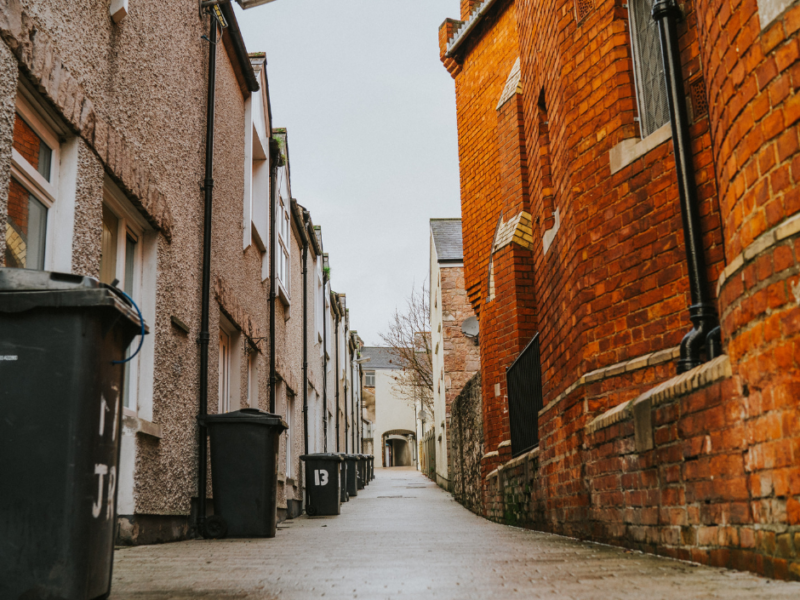
Written by Lorna Flanagan
Jenny drove into Armagh and met her old school friend for coffee.
‘So you’re a real city girl now, Olga,’ she teased.
‘Oh I still go back to the farm quite often, but, yes, I’d say the city’s great too.’
‘Not for me,’ said Jenny. ‘Too much traffic. Too much noise.’
Olga said, ‘Listen, I’ve something to show you.’ And she led the way as they turned right out of Embers and walked along Upper English Street. When they passed the Bank of Ireland on the right, she said, ‘That big stone building used to be the Beresford Arms Hotel back in the eighteenth century.’
Then between the bank and Papilio Beauty Clinic, they turned off the main street under an archway that Jenny had never even noticed. Jenny wondered why they had left the banks and salons and shops and traffic behind and were now heading for someone’s quiet back yard. But instead of a yard, she was surprised to find a second archway spanning the narrow lane, which then opened out slightly into a quiet retreat under the clear blue sky. She was amazed to see not only a terrace of small houses, and a children’s nursery, but also some parking space for residents.
‘How do people manage to get cars in here?’ she asked.
‘Look at the name,’ said Olga.
The name was Jenny’s Row. Jenny was delighted at the idea of an alleyway that bore her name.
‘Who’s Jenny? A beautician in the Beauty Clinic? Or did she live in the Row in days gone by? Or did she own it? Was she the sweetheart of a Georgian gentleman who led her down this lover’s lane? Look, there’s even room for a lovely wee garden.’
Olga laughed. ‘Oh Jenny, you’re such an incurable romantic!’
Jenny couldn’t help admiring the enclosed area with bushes, a tiny palm tree, pink roses, fuschia, variegated greenery, and pansies in large plant tubs.
‘You’d have liked it even more,’ said Olga, ‘before these houses were built. There used to be white-washed cottages here.’
‘White-washed cottages, wow … I can hear a cat mewing. Can you hear it? Where is it?’ She looked up. Maybe it was stretched out on a windowsill above, basking in the warm autumn sun. Or maybe it was hiding in the garden. Neither she nor Olga could see where it was.
They came to a path leading off to the left towards the rear view of the tall slim spire of the grey, stone-built First Presbyterian Church. Jenny was surprised to see that there was room on either side of this pathway, too, for neatly cut grass, small bushes, and a slender, yellow-berried rowan tree.
‘A rowan tree. A mountain ash. A magical tree that gives protection,’ she murmured.
‘I knew you’d love this place,’ said Olga, as they came to the end of Jenny’s Row, which now led out onto the Mall. ‘You see, you can find quiet places in cities too. Look, there’s a bollard at this end, so the people who live in the Row drive their cars in from the English Street side where we came in … ’
Jenny was looking up at the front of the red brick Gospel Hall on the corner, with its round tower on one side, its much taller rectangular tower on the other side, and the crow-stepped gable in the middle with its decorative brickwork.
‘ … and if you want to know who Jenny was, it tells you in the book I gave you, Armagh – City of Light and Learning. Look in the bit about cricket on the Mall.’
‘So who was she?’
‘It was a he, not a she. The Row is named after the Reverend Henry Jenny, a rector of Mullabrack in the eighteenth century.’
‘Jenny was a surname?’
‘Yes. Henry Jenny was a friend of Dean Jonathan Swift. You can read letters to him from the Dean. And they say Swift visited him in Armagh.’
‘Where did the Reverend live?’
‘In English Street. In the building that later became the Beresford Arms Hotel. A hotel with a long history. I’ve heard that the Royal Mail coach to Dublin used to leave the Beresford at six o’clock in the evening, and the coach coming in the other direction used to arrive at eight o’clock in the morning. The hotel had stables for fifty horses.’
‘Oh, let’s go back up through Jenny’s Row to take another look.’